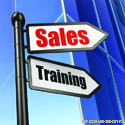
Kenny Chapman
Contributing Writer
The Blue Collar Success Group
Earlier this year I was in St. Louis performing my onsite Ultimate In-Shop Experience training where we cover the content from Service Sales Success School and I coach and ride along with the technicians. This happened to be one of the better companies in the country and it is always a treat to work with companies that really understand the importance of training and implementation. We can all learn from good examples.
One of the ways really successful companies succeed is through the client education processes. My service and sales training focuses on the importance of client education and the reality that if a front line team member can establish a certain level of likeability, credibility, and trust they are well positioned to earn that person’s business.
However, those things standing on their own are often not enough to get the sale and keep that client from “getting another quote” or “thinking about it” or a variety of real (and false) objections that we receive in the field on a daily basis. They are necessary components, because you must have built a relationship and have a connection with the client in order for them to say yes to you, your company, and service. Those are necessary just to get a shot at this client becoming one of ours.
Once you have established the benchmarks of trust and credibility, it becomes crucial that you know your stuff. Knowing your stuff shows up in many ways when it comes to successful client interaction. First of all, if you are presenting a product or service on that Options Sheet, then you better know the features and benefits of what that product or service can do for that client.
If you don’t know and convey that you know, how that product or service will benefit that client, then you are doing nothing more that attempting to sell them something. I’m not saying it might not be something that they need, but I am saying that they won’t be able to fully understand the “why” behind them needing this and they can become confused.
A confused person will not become a client. Most of the time they won’t even ask you to explain things in another way or go deeper, they will just give you a lip service objection and you will be on your way. People don’t ask all the questions they have, and they don’t like to look dumb. As their education based service providers, it is our professional responsibility to be able to clearly communicate why they might want or need to invest in your given options.
After my event in St. Louis, the lovely Christy and I found a place to have brunch not far from our hotel before we went to do some sight-seeing and ascend to the top of the Gateway Arch. Upon entering this restaurant we felt we were in for a good experience. Our hostess sat us and immediately our server met us with a pitcher of water, and the outstanding service began.
Christy and I both had questions on the menu and were ultimately stuck between two items each on this extensive menu. When we asked for comparisons, he launched into explanation mode and I felt like Wolfgang Puck himself was teaching me how to make a short rib omelet! This guy really knew this menu, how their chef’s prepared the dishes, what the presentations were like, and how to match menu items to his guest’s desires.
After a great brunch and being presented with the bill, I thanked him for his product knowledge and great service by saying, “Thank you for really knowing your stuff”. He smiled and quickly said back to me, “Thank you sir, but our food is way too good for me not to know my stuff!” He feels that he penalizes a customer if he can’t effectively match a menu item with what they are looking for because his product is so good.
What about you? Do you know your “stuff”? Are you training your technicians so they really know their “stuff”? Aren’t your products and services just like this restaurant – simply too good for your team to not be able to effectively communicate the superior value by doing business with your company?
Train your team. Coach your team. Inspect your team. See improved results.

